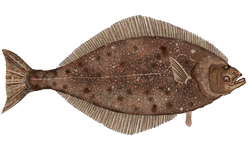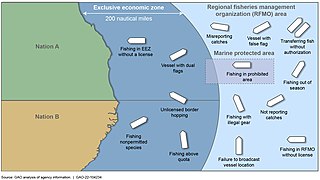The International Whaling Commission (IWC) is a specialised regional fishery management organisation, established under the terms of the 1946 International Convention for the Regulation of Whaling (ICRW) to "provide for the proper conservation of whale stocks and thus make possible the orderly development of the whaling industry".

Halibut is the common name for three flatfish in the genera Hippoglossus and Reinhardtius from the family of right-eye flounders and, in some regions, and less commonly, other species of large flatfish.

The Common Fisheries Policy (CFP) is the fisheries policy of the European Union (EU). It sets quotas for which member states are allowed to catch each type of fish, as well as encouraging the fishing industry by various market interventions. In 2004 it had a budget of €931 million, approximately 0.75% of the EU budget.

The Turbot War was an international fishing dispute and bloodless conflict between Canada and Spain and their respective supporters.

The Magnuson–Stevens Fishery Conservation and Management Act (MSFCMA), commonly referred to as the Magnuson–Stevens Act (MSA), is the legislation providing for the management of marine fisheries in U.S. waters. Originally enacted in 1976 to assert control of foreign fisheries that were operating within 200 nautical miles off the U.S. coast, the legislation has since been amended, in 1996 and 2007, to better address the twin problems of overfishing and overcapacity. These ecological and economic problems arose in the domestic fishing industry as it grew to fill the vacuum left by departing foreign fishing fleets.
The Northwest Atlantic Fisheries Organization (NAFO) is an intergovernmental organization with a mandate to provide scientific advice and management of fisheries in the northwestern part of the Atlantic Ocean. NAFO is headquartered in Halifax, Nova Scotia, Canada.

The National Marine Fisheries Service (NMFS), informally known as NOAA Fisheries, is a United States federal agency within the U.S. Department of Commerce's National Oceanic and Atmospheric Administration (NOAA) that is responsible for the stewardship of U.S. national marine resources. It conserves and manages fisheries to promote sustainability and prevent lost economic potential associated with overfishing, declining species, and degraded habitats.
The Halibut Treaty was a 1923 Canadian–American agreement concerning fishing rights in the northern Pacific Ocean. The treaty established the International Pacific Halibut Commission (IPHC) as a mechanism for the joint management of the Pacific halibut which, at that time, was in severe decline. The commission originally had four members but now has six, which are selected from industry and related government agencies. Half the members are Canadian and half are from the United States. The treaty also had a provision for a closed season, so halibut could not be fished during the more dangerous winter months. The treaty has been revised numerous times, often based on recommendations from the IPHC and its team of scientific researchers.

The Marine Mammal Protection Act (MMPA) was the first act of the United States Congress to call specifically for an ecosystem approach to wildlife management.

Hippoglossus stenolepis, the Pacific halibut, is a species of righteye flounder. This very large species of flatfish is native to the North Pacific and is fished by commercial fisheries, sport fishers, and subsistence fishers.

The North Pacific hake, Pacific hake, Pacific whiting, or jack salmon is a ray-finned fish in the genus Merluccius, found in the northeast Pacific Ocean from northern Vancouver Island to the northern part of the Gulf of California. It is a silver-gray fish with black speckling, growing to a length of 90 cm (3 ft). It is a migratory offshore fish and undergoes a daily vertical migration from the surface to the seabed at depths down to about 1,000 m (3,300 ft). It is the object of an important commercial fishery off the West Coast of the United States, and annual quotas are used to prevent overfishing.

Illegal, unreported and unregulated fishing (IUU) is an issue around the world. Fishing industry observers believe IUU occurs in most fisheries, and accounts for up to 30% of total catches in some important fisheries.

The National Oceanic and Atmospheric Administration Fisheries Office of Law Enforcement is a federal police part of the National Marine Fisheries Service of the National Oceanic and Atmospheric Administration, headquartered in Silver Spring, Maryland. The leadership consists of Director James Landon, Deputy Director Logan Gregory, Assistant Director Todd Dubois, and Budget Chief Milena Seelig.

As with other countries, the 200 nautical miles (370 km) exclusive economic zone (EEZ) off the coast of the United States gives its fishing industry special fishing rights. It covers 11.4 million square kilometres, which is the second largest zone in the world, exceeding the land area of the United States.

The Western and Central Pacific Fisheries Commission (WCPFC) is both a general and a tuna regional fisheries management organisation established to conserve and manage tuna and other highly migratory fish stocks across the western and central areas of the Pacific Ocean. Its full name is Commission for the Conservation and Management of Highly Migratory Fish Stocks in the Western and Central Pacific Ocean. It commenced operations in late 2005, and its secretariat is based in Pohnpei, in the northern Pacific state of the Federated States of Micronesia.
The North Pacific Anadromous Fish Commission (NPAFC) is an international, inter-governmental organization dedicated to the conservation of anadromous fish stocks in international waters of the North Pacific Ocean and its adjacent seas. It was established on 11 February 1992 by the Convention for the Conservation of Anadromous Stocks in the North Pacific Ocean and originally consisted of four member nations: Canada, Japan, Russian Federation, and United States of America. On 27 May 2003, the Republic of Korea acceded to the Convention bringing the current number of Commission members to five. The primary objective of the Commission is to provide a mechanism for international cooperation promoting the conservation of anadromous stocks in the NPAFC Convention Area of the North Pacific Ocean.

The Pacific Islands Forum Fisheries Agency (FFA) is an intergovernmental agency established in 1979 to facilitate regional co-operation and co-ordination on fisheries policies between its member states in order to achieve conservation and optimum utilisation of living marine resources, in particular highly migratory fish stocks, for the benefit of the peoples of the region, in particular the developing countries. The office campus is located in Honiara, Solomon Islands
The Seattle Fishermen's halibut strike of 1912 took place the year after a decision to establish the Port of Seattle and before construction had begun. The strike, organised by the newly formed Deep Sea Fishermen's Union, lasted three months. The issues causing the strike were working conditions, wages, and regulation of catches and prices, and by the terms on which it was settled the strikers achieved some of their aims.
High seas fisheries management refers to the governance and regulation of fishing activities in areas beyond national jurisdiction, often referred to as the ‘high seas’. The 1982 United Nations Convention on the Law of the Sea (UNCLOS) and the 1995 United Nations Fish Stock Agreement (UNFSA) provide the international legal framework for the regulation of fishing activities in areas beyond national jurisdiction. The United Nations Fish Stock Agreement delegates responsibility for conservation and management of fish stocks to regional fisheries management organizations (RFMOs) each governing a geographical area of the high seas.












